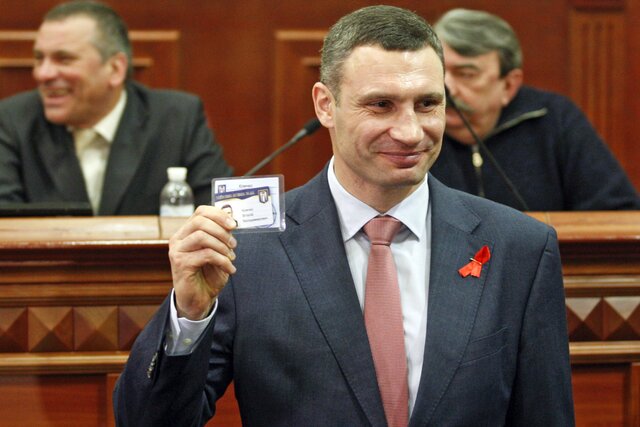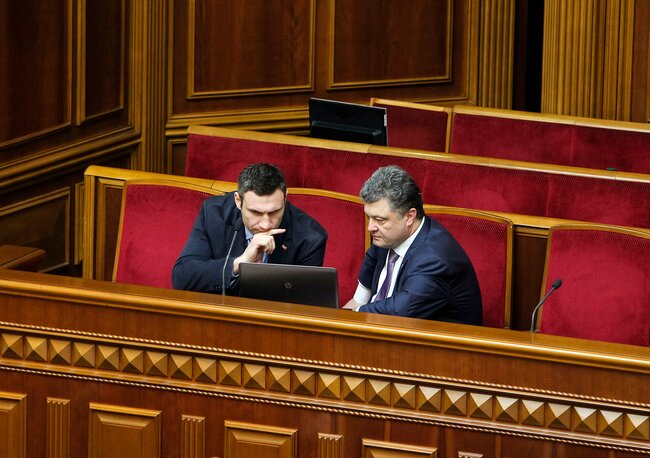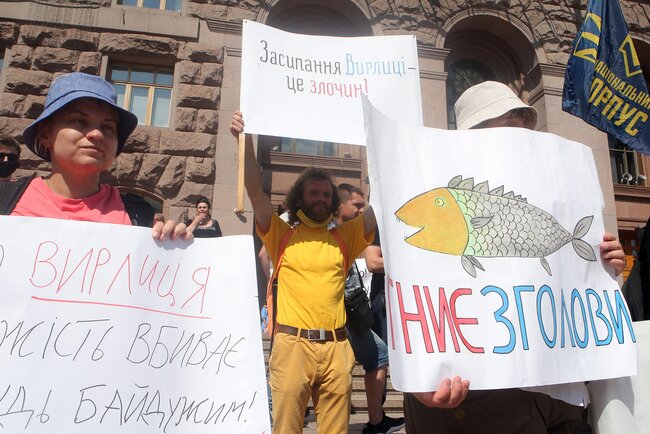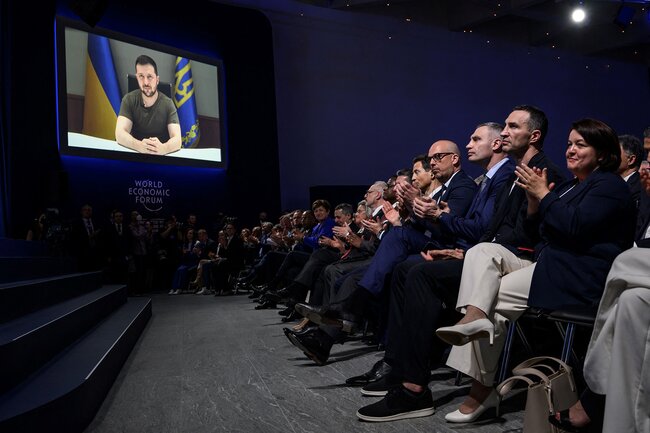The president’s rival. The feud between Zelensky and Kyiv Mayor Vitali Klitschko goes back years. Here why it’s flaring up again.
Manage episode 489326230 series 3381925

Ukrainian President Volodymyr Zelensky and Kyiv Mayor Vitali Klitschko have been at odds for more than five years. Klitschko, an ambitious former boxer, has so far managed to keep the president’s team from bringing the Ukrainian capital to heel. Their rivalry has ebbed and flowed, but it’s flared up again in recent weeks. “I once said our country smells like authoritarianism. Now, it reeks,” Klitschko told The Times in late May 2025. The president’s office has yet to respond publicly to the jab. Journalist and researcher Konstantin Skorkin explains what’s really at stake in the fight between Zelensky and Klitschko.
Klitschko enters the political ring
Klitschko’s path to the Kyiv mayor’s office was a long one. In 2005, after retiring from boxing, he decided to try his hand at politics. The following year, he ran for mayor for the first time. Though popular among young voters and the pro-European middle class, Klitschko came second with 23.7 percent of the vote, losing to the eccentric populist banker Leonid Chernovetskyi, who won 32 percent of the generally conservative electorate.
In a snap mayoral election in 2008, Klitschko’s support dropped further: he finished third with 17.9 percent, while Chernovetskyi was re-elected with 37.7 percent. In 2010, Klitschko founded his own party, the Ukrainian Democratic Alliance for Reform (UDAR). In 2012, he led UDAR into parliament, winning about 14 percent of the vote.
Meduza has condemned Russia’s invasion of Ukraine from the very start, and we are committed to reporting objectively on a war we firmly oppose. Join Meduza in its mission to challenge the Kremlin’s censorship with the truth. Donate today.
During the Euromaidan protests in the winter of 2014, Klitschko emerged as an opposition leader and a possible presidential candidate after the fall of Viktor Yanukovych. However, another protest leader, Petro Poroshenko, brokered a deal with Klitschko — with the help of oligarch Dmytro Firtash — in which Klitschko agreed to stay out of the presidential race in exchange for Poroshenko’s support in the Kyiv mayoral election. Poroshenko went on to win the presidency in the first round, while Klitschko won the mayoral race with 56 percent. UDAR secured a majority in the city council.
Klitschko was re-elected in 2015, winning 64.1 percent in a runoff. That same year, his party merged with Poroshenko’s political bloc, and Klitschko became its leader. In 2016, he also became head of the Association of Ukrainian Cities, a key local government organization.

In 2019, Poroshenko lost the presidency to Volodymyr Zelensky, who was backed by oligarch Ihor Kolomoisky — a longtime rival of Poroshenko. Political analyst Kostyantyn Bondarenko recalls a revealing anecdote from this era in his biography of Zelensky. In November 2018, shortly before officially entering the presidential race, Klitschko attended the birthday party of Ihor Surkis, owner of the Dynamo Kyiv soccer team, hosted by Zelensky. Klitschko reportedly joked: “Ihor Mykhailovych! The fact that four Ukrainian presidents are here, and the future president is hosting the party, says everything about your stature.” Zelensky replied, “Vitali, if I become president, I promise I’ll make sure you host Ihor Mykhailovych’s next birthday.” Klitschko later confirmed the story in an interview.
The anecdote illustrates the strained relationship between the two big personalities — but the roots of the conflict run deeper. Klitschko’s alignment with Poroshenko and sway over Kyiv, the political and economic heart of Ukraine, made him a natural rival to the newly elected Zelensky.
Zelensky and Klitschko
Round One: 2019–2020
After winning the presidency, Zelensky set about removing remnants of the old elite. He fired the government, dissolved parliament, and called early elections. His team also considered early local elections but backed down over budget concerns. In Kyiv, though, they tried a different tactic.
Ukraine’s capital has a dual power structure: in addition to the elected mayor, there’s a head of the Kyiv City State Administration (KCSA), a presidential appointee. This arrangement dates back to 1993. While the mayor handles local governance — approving budgets, overseeing city infrastructure — the KCSA chief enforces national laws and presidential decrees. Under Poroshenko, Klitschko held both roles, which was legal. Zelensky’s team saw an opportunity to split the roles and weaken Klitschko’s grip.
After a meeting with Zelensky in July 2019, Klitschko told reporters, “The president confirmed the rumors — he plans to appoint his own person to head the administration.” Two weeks later, Andriy Bohdan, Zelensky’s chief of staff, tried to fire Klitschko from the KCSA and replace him with someone loyal. He also accused Klitschko of corruption. The move echoed Yanukovych’s tactics in 2010, when he removed Chernovetskyi from the KCSA amid similar allegations and installed a loyalist who ran the city in his place. But in the end, it was Bohdan who was removed. His successor, Andriy Yermak, subsequently managed to de-escalate the conflict between the president and the mayor.
Zelensky’s inner circle
In the 2020 local elections, Zelensky’s party, Servant of the People, ran an obviously weak candidate, Iryna Vereshchuk, for Kyiv mayor, allowing Klitschko to win outright in the first round with 50.5 percent. UDAR again took a majority in the city council. But the truce was short-lived.
Round Two: 2021
In the spring of 2021, hostilities between Zelensky and Klitschko resumed. At the start of that year, Zelensky’s approval ratings had dropped sharply: while he won 73 percent of the vote in the 2019 presidential election and still enjoyed 68 percent support by the end of that year, by January 2021 his rating had plunged to just 19.8 percent. Against this backdrop, political tensions in the country escalated. The local elections in October 2021 became the first serious test for Zelensky’s administration — and not just in Kyiv: Candidates from his Servant of the People party failed to win mayoral races in any of Ukraine’s regional capitals.
Klitschko was not a serious national rival — his approval was about one percent in early 2021 — but as Kyiv’s mayor, he wielded considerable influence during the political crisis.
In May, law enforcement launched raids targeting Klitschko’s associates and several municipal agencies. Police even visited his building — though later claimed they were there for his neighbors. The home of Klitschko’s longtime associate, UDAR party leader Artur Palatny, was also searched.
Zelensky’s team insisted the crackdown was tied to misconduct by city officials. The president himself publicly accused Kyiv’s government of corruption. Asked if he saw Klitschko as a presidential rival, Zelensky said: “My chief of staff doesn’t take bribes, so we’re not competitors.” Klitschko fired back, calling it a politically motivated hit job by “Yanukovych’s heirs.” “This looks rushed and biased. You’re recycling the same scheme Yanukovych used against Chernovetskyi,” he said.

Seeking support, Klitschko turned to the West, raising the issue of pressure on local government during meetings with U.S. Secretary of State Antony Blinken and his deputy Victory Nuland during their visit to Kyiv. When German Chancellor Angela Merkel visited Ukraine, Klitschko was barred from meeting her, sparking an international scandal.
Tensions escalated further when Zelensky revived the plans to separate the mayoral and KCSA posts. In August, amid rumors of his imminent dismissal, Klitschko refused to attend a National Security and Defense Council meeting, citing a last-minute invitation while he was out of town. The President’s Office saw this as sabotage, dismissed his trip as a “PR stunt,” and accused Kyiv’s government of being “out of touch with reality.”
Round Three: 2023
Russia’s full-scale invasion briefly put political feuds on hold. As Russian tanks closed in on Kyiv, Zelensky and Klitschko worked together to defend the city. But once the front lines stabilized, tensions returned — this time over conflicts between elected mayors and military-appointed officials in cities under martial law. These clashes often ended in suspensions or arrests of mayors on either real or trumped-up charges.
In one high-profile case, Chernihiv Mayor Vladyslav Atroshenko was removed by court order for allegedly using an official vehicle for personal reasons. Days earlier, he had publicly criticized the central government’s inaction at the start of the war — even though he had helped lead the city’s defense and been awarded a medal by Zelensky.
As head of the Association of Ukrainian Cities, Klitschko condemned the pressure on local governments. He supported Atroshenko publicly and attended his court hearing. In May 2023, when Odesa Mayor Hennadiy Trukhanov was arrested over a six-year-old corruption case, Klitschko again defended him and offered to post bail. Trukhanov was released on bond, and the case remains under consideration.
Within Zelensky’s circle, Klitschko remained a serious rival. His approval reached 58 percent in 2023 — fourth nationwide behind Zelensky, volunteer Serhiy Prytula, and president adviser Mykhailo Podolyak. Rumors swirled that Klitschko planned to relaunch UDAR and bring in his brother Wladimir, also a popular former boxer.
In June, speculation grew that Zelensky’s office was looking to remove Klitschko from the KCSA. Reportedly, their preferred replacement was Strategic Industries Minister Oleksandr Kamyshin, who had supposedly already interviewed for the role. However, the shake-up never materialized.

In late 2023, as tensions rose between Zelensky and Ukraine’s top army commander, Valerii Zaluzhnyi, Klitschko publicly backed the general. When Zelensky began planning Zaluzhnyi’s removal, Klitschko criticized the move — a rebuke the President’s Office couldn’t ignore.
Round Four: 2024–2025
In late 2024, Zelensky’s office launched a fresh offensive against the Kyiv mayor’s office, this time using the post of head of the Kyiv Military Administration as its battering ram. Created in 2022 during a direct military threat to Kyiv, the role was initially held by generals. But in December 2024, the post went to a civilian official, Tymur Tkachenko, who knows both Klitschko and city governance well — he even ran for city council in 2020 as a UDAR candidate.
From day one, Tkachenko clashed with Klitschko, accusing City Hall of running shady operations and threatening to place the city budget under external supervision. Authorities soon began targeting Klitschko’s allies. In April 2025, his deputy Volodymyr Prokopiv was placed under house arrest over allegations of helping draft dodgers evade mobilization. That same month, police raided the homes of UDAR-affiliated city council members.
In an interview with The Times in May 2025, Klitschko directly accused Zelensky of authoritarianism: “This is a purge of democratic principles and institutions disguised as wartime governance. I once said our country smells like authoritarianism. Now, it reeks.”
Klitschko’s team now fears a repeat of the “Chernihiv scenario” (referring to the forced removal of Chernihiv Mayor Atroshenko). The outlet Strana has reported an alleged plan to appoint Tkachenko as city council secretary — a role that, under martial law, would make him acting mayor if Klitschko were removed, since elections are suspended. In a preemptive move, Klitschko nominated opposition figure Zoya Yarosh from the opposition party Holos for the post.
It’s unclear how this round will end. Despite widespread frustrations with corruption and crumbling infrastructure, Klitschko remains popular in Kyiv. According to recent polls, most residents still want him as mayor. That said, Klitschko’s national popularity remains low, and without the mayoralty as a political platform, mounting a serious campaign would be difficult.
Be that as it may, Zelensky’s team appears determined to sideline its most prominent opponents ahead of inevitable postwar elections. The political battle for control of Ukraine’s capital has dragged on for more than five years. For Zelensky, taking Kyiv remains a key prize. But even in wartime, local self-government remains a real force — and so far, the President’s Office has failed to unseat the mayor it sees as a threat.
The painting in Zelensky’s bedroom
Analysis by Konstantin Skorkin
65 episodes




